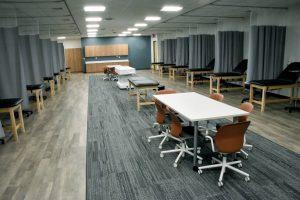By Leigh-Ellen Romm

As the population surges in Texas, access to quality healthcare becomes more difficult. The Texas Medical Association reports that Texas is well below the national average of 246 physicians per 100,000 people with only 204.6 patient care physicians per 100,000. Austin College is proud to announce—help is on the way.

Photo by Cary S. Wacker
In October 2023, the new Austin College Master of Medical Science-Physician Assistant degree program received provisional accreditation and began admitting applicants for the first class to matriculate in June 2024. With just two years of post-graduate study and successful completion of licensing exams, the graduates of the new program will be PAs who can diagnose, treat, and follow up with patients while working with a supervising physician.
“I believe adding this program at this time is an illustration of Austin College’s responsiveness to a very real and immediate need,” President Steven P. O’Day said. “We are going to rise to the moment in the community, the region, and the country. Healthcare shortages need to be addressed, and we, as an institution, have embraced that.”
The vision for a PA program was unveiled in May 2021. President O’Day and Dr. Beth Gill, Vice President for Academic Affairs, along with faculty members Dr. David Griffith, Professor of Business Administration, and Dr. Kelly Reed, Professor of Biology and Director of Pre-Health Sciences, presented compelling data for the new master’s degree and secured unanimous approval from the Austin College Board of Trustees.
Recalling that pivotal vote, O’Day said, “A moment before the confirmation, one of the Board trustees—also a physician—raised his hand and said, ‘This is not something Austin College should do.’ Then he paused … and added, ‘This is something Austin College has to do.’ That was an important moment because an initial investment by the institution was required to build a new degree program. And, to some extent it was an ‘if you build it, they will come’ moment.”
Before even applying for provisional accreditation, a new PA program must be poised for operation with facilities secured, director and faculty hired, curriculum developed, clinical sites confirmed, and financial support in place.

Photo by Nicholas Hummert
Dr. Diana Noller, founding director of the new program and Associate Professor of Medical Science, attributes the commitment of the inaugural faculty and staff to their desire to serve others. “We recognize that the community needs better access to healthcare … we value being a part of the solution,” she said.
Significant gifts totaling more than $1.25 million supported the start-up costs and build-out of the satellite Austin College Health Campus. Generous benefactors with longstanding ties to the College include the Hillcrest Foundation, Texoma Health Foundation, Clara Blackford Smith and W. Aubrey Smith Charitable Foundation, M.B. and Edna Zale Foundation, and individual donors.
The 13,000-square-foot, state-of-the-art facility is in Denison, next door to Texoma Medical Center. It includes classrooms, faculty offices, treatment simulation rooms, and shared spaces for collaboration. The inclusive design provides a variety of ways to interact with anatomy including virtual dissection tables and mixed-reality lenses for holographic study of the human body.
The 24-month program includes 13 months of classroom training and 11 months of clinical training with rotations through outpatient, inpatient, emergency department, and operating room settings. More than 100 medical sites have partnered with the College for these rotations, including Texoma Medical Center, Medical City, Baylor Scott & White, and University of Texas Southwestern Medical Center, along with other clinics and private practice offices.
Of the 306 PA programs nationwide, Austin College will be set apart by the close-knit community created by prioritized inclusivity, low student-to-faculty ratio, and small campus—the same hallmarks of the Austin College undergraduate experience.
“Our values of excellence, introspection, accountability, and engagement are very important to us,” Noller said. “And the way we live those out in everyday practice is unique. We also have thought
about how to be inclusive of others… which means we are building a program that’s accessible to the greatest number of people to the greatest extent possible. That is not commonly found in PA education.”
Austin College has a long-standing reputation for educating and preparing qualified students for medical school. The new Master of Medical Science-Physician Assistant degree will help more students realize their dreams of a career in medicine while helping solve the problem of a healthcare shortage.
The ARC-PA has granted Accreditation-Provisional status to the Austin College Physician Assistant Program sponsored by Austin College. Accreditation-Provisional is an accreditation status granted when the plans and resource allocation, if fully implemented as planned, of a proposed program that has not yet enrolled students appear to demonstrate the program’s ability to meet the ARC-PA Standards or when a program holding Accreditation-Provisional status appears to demonstrate continued progress in complying with the Standards as it prepares for the graduation of the first class (cohort) of students. Accreditation-Provisional does not ensure any subsequent accreditation status. It is limited to no more than five years from matriculation of the first class.
